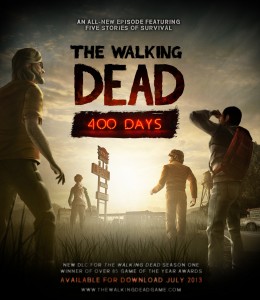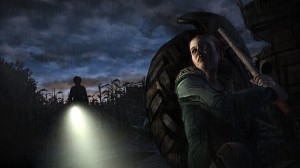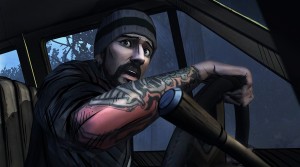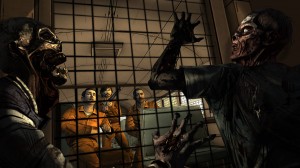 BUY FROM AMAZON: RIGHT HERE!
BUY FROM AMAZON: RIGHT HERE!
PLATFORM: XBLA, PSN, PC, Mac, iOS
PRICE: $4.99 (Walking Dead Season 1 required)
ESRB RATING: M
DEVELOPER: Telltale Games
PUBLISHER: Telltale Games
Justin: By all logistical rights, going from The Last of Us to more Walking Dead should feel like I’m being hamstrung by a world where I’m no longer in control of my game in favor of a long series of dialogue maps. Instead, I actually feel unshackled by 400 Days, better able to take control of the apocalypse happening around me. As a continuation of Season 1, it’s little more than a Season 2 appetizer, and yet, there’s a quality and economy of storytelling here that still puts it head and shoulders above most of what I’ve already played this year.
Maxwell: That feeling of being in control is an interesting one and something I’d like to touch on in a minute, but I definitely agree with you about the economy of the storytelling. At $5 it was clear this was going to be a bite-sized addition, and appropriately for the price the amount of content here is roughly that of one of the episodes from Season 1. The main difference of course is that 400 Days tells not one, but five different stories set during various times post-outbreak. Without getting into spoilers there’s definitely some overlap, both straightforward and subtle, between the various tales, but for the most part, each is a distinct entry. Also, the carry-over from the first season is limited to a handful of tertiary characters and an easily missed”cameo.” Considering Telltale is essentially starting from scratch with five protagonists and their corresponding casts of characters, it’s actually kind of amazing just how much plot and character development they manage to pack into what are essentially 15-30 minute vignettes. Yet while I do think the storytelling in general is still solid, the biggest problem for me come from comparisons to the 800 pound gorilla in the room: Walking Dead’s first season.
Justin: To be fair, the first season had the best ensemble of characters I’d seen in gaming in ages, trumping a ton of TV/films in the process, so chances are good putting most things up against Season 1 will result in something unfavorable. Which of the folks from 400 Days show up in Season 2 is still a mystery, but 400 Days’ worth ultimately hinges on who I’d be willing to be saddled with for the same period of time. Out of the new bunch, I’m definitely invested in Bonnie and Vince, a drug addict in recovery and an escaped convict, respectively. Wyatt feels like he’d at least be fun to have around just from his dialogue with his buddy in the car. Russell and Shel–a young hitchhiker and the woman appointed co-leader of a refuge holed up at the fateful truck stop–feel like self-contained stories I don’t really need to see more of. Well-told contained stories, but still. Do I feel like any of them live up to the promise of Season One? No, but I also don’t think they’re meant to. Yet.
 Maxwell: Honestly I can’t say I’m particularly “invested” in any of the characters at this point. While Telltale does an admirable job of getting you up to speed quickly with a bare minimum of exposition, all five of the stories suffer from the fact that you simply don’t get a lot of time to learn what these characters are about, which is problematic when you’re supposed to be playing as them. With Lee Telltale had the option of slowly building the character as you played, which meant that there was a constant, organic back and forth as you simultaneously shaped Lee via your decisions and in turn were influenced by his actions and the gradual reveal of his history. It made for a smooth transition into the role as player because you were able to learn about Lee through his behavior and interactions, first with Clementine then with the other survivors. Having Lee meet these characters also ensured that he/the player were always on the same page in terms of understanding the fictional world. Conversely, in 400 Days you’re constantly being dropped into the middle of the action, with the result that you’re often floundering to figure out who these people are and how you should react to them. With Bonnie for example, your first encounter is a discussion with a married survivor that turns slightly flirtatious. Except as the player unless you’re being particularly observant (wedding ring), there’s no way to know the guy’s married until you’re already well into the conversation. Even then you have no context for the situation, and thus it’s hard to get a handle on how you’re supposed to feel about it. Ultimately it left me disengaged, like I had swapped a choose your own adventure book for a choose some random dude’s adventure book. The need to condense the narrative also leads to a lot of the characters feeling more cliched and stereotypical than they did in season 1. Without the additional characterization and nuance offered by the extended experience, we’re left with snapshots of people usually at their most extreme moments, resulting in a lot of old-hat zombie scenarios. Again, the moment to moment narrative is by and large quite good, it’s just that rather than feeling like a proper appetizer to these characters’ fate in season 2, this feels like someone served me a bite of five different entrees, a much less satisfying experience.
Maxwell: Honestly I can’t say I’m particularly “invested” in any of the characters at this point. While Telltale does an admirable job of getting you up to speed quickly with a bare minimum of exposition, all five of the stories suffer from the fact that you simply don’t get a lot of time to learn what these characters are about, which is problematic when you’re supposed to be playing as them. With Lee Telltale had the option of slowly building the character as you played, which meant that there was a constant, organic back and forth as you simultaneously shaped Lee via your decisions and in turn were influenced by his actions and the gradual reveal of his history. It made for a smooth transition into the role as player because you were able to learn about Lee through his behavior and interactions, first with Clementine then with the other survivors. Having Lee meet these characters also ensured that he/the player were always on the same page in terms of understanding the fictional world. Conversely, in 400 Days you’re constantly being dropped into the middle of the action, with the result that you’re often floundering to figure out who these people are and how you should react to them. With Bonnie for example, your first encounter is a discussion with a married survivor that turns slightly flirtatious. Except as the player unless you’re being particularly observant (wedding ring), there’s no way to know the guy’s married until you’re already well into the conversation. Even then you have no context for the situation, and thus it’s hard to get a handle on how you’re supposed to feel about it. Ultimately it left me disengaged, like I had swapped a choose your own adventure book for a choose some random dude’s adventure book. The need to condense the narrative also leads to a lot of the characters feeling more cliched and stereotypical than they did in season 1. Without the additional characterization and nuance offered by the extended experience, we’re left with snapshots of people usually at their most extreme moments, resulting in a lot of old-hat zombie scenarios. Again, the moment to moment narrative is by and large quite good, it’s just that rather than feeling like a proper appetizer to these characters’ fate in season 2, this feels like someone served me a bite of five different entrees, a much less satisfying experience.
Justin: Such is the nature of DLC, though, and I give Telltale benefit of the doubt that what we set up here isn’t just a demo for Season 2, but something that will add quite a bit more flavor to the proceedings when it actually happens. The lack of context, I can live with, knowing going in that these are mere snapshots of these folks, enough to get a feel for each, where they come from, what they’ve done, and how the player chooses to play them. It’s a style you don’t see often in gaming, and it’s kind of an important step ultimately in how stories can be told. Not every game needs 10-12 hours to be worthwhile, and Telltale exploring their options the same way that TV has been the last few years bodes well for the medium. Granted, however, that I’m a little flat on the epilogue for the reasons you state. Quite a bit of story happens in between the end of each of these stories and when we get to the campfire, and I’d have gladly paid money to hear the rest. Instead, it’s perfunctory, “Poochie went back to his home planet” one-liners for a bunch of folks; some, like the punk rock leader of Shel’s camp, are stories I’d have taken as full fledged 2-3 hour DLC. That’s a little bit on the unsatisfying side, but I’m ultimately still curious how the final split pans out for them all.
 Maxwell: I’m inclined to give Telltale some leeway as well, but as the old sayings goes “if if’s and but’s were candy and nuts, then sentences would be a lot more confusing.” While the episodes in season 1 had their fair share of loose ends and cliff-hangers, even taken individually none of the individual episodes had the same sort of anti-climatic “wait, that’s it?” moments as some of these vignettes. Vince’s story in particular feels like it’s over before it even gets started. It would be one thing if all these moments were jumping off points to a more detailed story, but the ending basically nixes that possibility. Like you said, it feels like a big chunk of the story happened when you weren’t around, which even with the large jumps in time was never a problem before. I also found it interesting that one of the scenes had characters playing a game of “would you rather,” as one of the (few) criticisms leveled against the original was that it essentially boiled down to a series of “this or that” situations with some flavor thrown in. Of course, that’s unfairly reductionist and misses the point that the flavor is what makes those choices so meaningful, but here it feels true to a degree. I have so little invested in these characters that instead of my decision-making being determined by in-game factors like “what’s best for the group” or “how do I feel about this person” I just found myself sticking to whatever decision on the surface seemed least dickish. In the first season I made some decisions in the heat of the moment I genuinely regretted, but it added to the experience because those decisions came about from being immersed in the fiction, something I never experienced here.
Maxwell: I’m inclined to give Telltale some leeway as well, but as the old sayings goes “if if’s and but’s were candy and nuts, then sentences would be a lot more confusing.” While the episodes in season 1 had their fair share of loose ends and cliff-hangers, even taken individually none of the individual episodes had the same sort of anti-climatic “wait, that’s it?” moments as some of these vignettes. Vince’s story in particular feels like it’s over before it even gets started. It would be one thing if all these moments were jumping off points to a more detailed story, but the ending basically nixes that possibility. Like you said, it feels like a big chunk of the story happened when you weren’t around, which even with the large jumps in time was never a problem before. I also found it interesting that one of the scenes had characters playing a game of “would you rather,” as one of the (few) criticisms leveled against the original was that it essentially boiled down to a series of “this or that” situations with some flavor thrown in. Of course, that’s unfairly reductionist and misses the point that the flavor is what makes those choices so meaningful, but here it feels true to a degree. I have so little invested in these characters that instead of my decision-making being determined by in-game factors like “what’s best for the group” or “how do I feel about this person” I just found myself sticking to whatever decision on the surface seemed least dickish. In the first season I made some decisions in the heat of the moment I genuinely regretted, but it added to the experience because those decisions came about from being immersed in the fiction, something I never experienced here.
Justin: This, I agree with. Because the Lee/Clementine story was such a clear vision on Telltale’s part, one that involved the player the whole way, the jump between 5 characters, ALL representing the player’s own mind gives the game a schizophrenia I hadn’t quite prepared for. These aren’t all good people, but I sure as hell played like they were. It’d be like if Mass Effect allowed you to make decisions on behalf of Jack, Mordin, and Liara. The variety that makes those characters interesting would be lost if they all were trying to do the right thing, at all times. That’s the situation we come to here, even though there’s still highly fucked up consequences for trying. Bonnie might be the one innocent in the group, and yet, “the accident” leaves us in Irreversible territory. It’s a problem here, but one where it also lets the player figure out the world that we will arrive at when Season 2 starts.
Maxwell: It also exacerbated what had been a minor issue, namely protagonists either behaving in unexpected ways or ignoring what seems like an obvious solution. The words “Hey, stupid” were uttered more than once, and I found myself picking what seemed like an innocuous bit of dialogue to continue the story only to have my character take some drastic action. I suppose I should also mention that the “play” part of the gameplay still hovers around serviceable (with one VERY glaringly gamey section) and I really hope we see a new or drastically revamped engine for the next outing, but neither aspect is significantly better or worse than the original.
 Justin: I actually like that Telltale started trying to find the balance between old-school adventure and mini-game somewhere around Episode 4, and 400 Days represents another step forward in trying to get there. That said, the cornfield sequence is a full on Dick Van Dyke pratfall that doesn’t work. The sensibility is right. The execution is 31 flavors of wrong.
Justin: I actually like that Telltale started trying to find the balance between old-school adventure and mini-game somewhere around Episode 4, and 400 Days represents another step forward in trying to get there. That said, the cornfield sequence is a full on Dick Van Dyke pratfall that doesn’t work. The sensibility is right. The execution is 31 flavors of wrong.
Maxwell: Ultimately though these problems are really only glaring in the face of what has come before, and it’s hard to ignore Telltale’s talents as story-tellers, especially in a genre that by all logic should be more than tapped at this point. I don’t think 400 Days represents a dip in quality so much as an experiment in narrative that isn’t quite as effective as the original, and it certainly does nothing to temper my excitement for Season 2.
Rating: 




Out of a Possible 5 Stars
Justin: I personally don’t separate 400 Days from anything Lost or Breaking Bad, or Sons of Anarchy or whathaveyou was trying to do between seasons to keep the home fires warm, and releasing in the new release dead zone was the smartest move. For $5, getting to play around more in Walking Dead’s particular brand of human nastiness is more than worthwhile, especially when there’s as much going on here as there is. The experiment is a success, if not without its reservations. Considering that main reservation is that it makes one drool Pavlovian for Season 2 to get here to find out where they’re going with this, I’d say that success is set in stone.
Rating: 




Out of a Possible 5 Stars
Face me on the Twitter
Tweet me on the Facebook

—————————————————–
Follow me on Twitter
